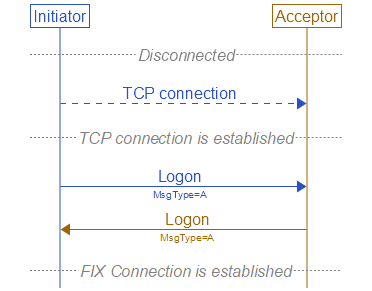Structure | Sample Message | Related Messages DescriptionThe Logon <A> message authenticates a user establishing a connection to a remote system. The Logon <A> message must be the first message sent by the application requesting to initiate a FIX session. The HeartBtInt <108> field is used to declare the timeout interval for generating heartbeats (same value used by both sides). The HeartBtInt <108> value should be agreed upon by the two firms and specified by the Logon initiator and echoed back by the Logon acceptor. Upon receipt of a Logon <A> message, the session acceptor will authenticate the party requesting connection and issue a Logon <A> message as acknowledgment that the connection request has been accepted. The acknowledgment Logon <A> can also be used by the initiator to validate that the connection was established with the correct party.  Successful Logon Successful LogonThe session acceptor must be prepared to immediately begin processing messages after receipt of the Logon <A>. The session initiator can choose to begin transmission of FIX messages before receipt of the confirmation Logon <A>, however it is recommended that normal message delivery wait until after the return Logon <A> is received to accommodate encryption key negotiation. The confirmation Logon <A> can be used for encryption key negotiation. If a session key is deemed to be weak, a stronger session key can be suggested by returning a Logon <A> message with a new key. This is only valid for encryption protocols that allow for key negotiation. (See the FIX Web Site's Application notes for more information on a method for encryption and key passing.) The Logon <A> message can be used to specify the MaxMessageSize <383> supported (e.g. can be used to control fragmentation rules for very large messages which support fragmentation). It can also be used to specify the MsgTypes supported for both sending and receiving. Structure
Sample MessageThe '^' character is used to represent SOH character. 8=FIX.4.4^9=102^35=A^49=BuySide^56=SellSide^34=1^52=20190605-11:40:30.392^98=0^108=30^141=Y^553=Username^554=Password^10=104^
Related Messages |
||||||||||||||||||||||||||||||||||||||||||||||||||||||||||||||||||||||||||||||||||||
We track how people interact with our online web content and resources, and some of that tracking involves storing cookies on your device. By continuing to use our site you accept that you agree to this. For more details see our Cookie usage, and Data Privacy and Protection Policies.